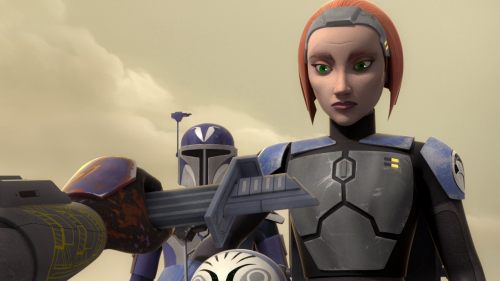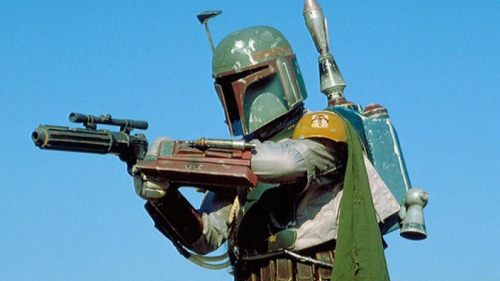Twenty Years Later, THE PHANTOM MENACE Has Become A Camp Classic
It’s been twenty years since George Lucas violently expelled Star Wars Episode I: The Phantom Menace onto movie theater screens across the world. Since then, the hardest of the hardcore Star Wars aficionados are still tending to the deep wounds left by a movie that promised to change their lives and instead had an alien rabbit with a Jamaican accent stepping in poop. After two decades, there are a lot of people who still hate this movie for its languid pacing, wooden acting, and one-dimensional characters.
But against our collective better judgment, we remain fascinated by the ineptitude of it all. The other two prequel films are pretty rough, but Phantom Menace is the one lodged in the popular consciousness like a popcorn kernel trapped in your gums. The Phantom Menace doesn’t endure because it’s good or because it’s in any way a noble failure. In fact, it might be on the list of the least noble movies of all time. No, The Phantom Menace is being feted after 20 years because movie websites need something to write about and nostalgia always works.
Wait, sorry. That’s not it. Please strike that. What I meant to say is that ThePhantom Menace is unintentionally hilarious and gets funnier every year since its debut in 1999. Humor is, as you know, one of the most subjective forms of artistic expression there is, because most jokes require a cultural reference point or a common perspective. The list of universally appreciated comedic acts starts and ends with a person getting hit in the groin, because we all have groins. George Lucas goes for humor in that vein with Jar Jar Binks, but fails miserably. Jar Jar gets his tongue electrocuted, he steps in the aforementioned space poop, and makes exaggerated “Oh no, someone is going to cut me in half with a lightsaber” faces in just about every scene. Jar Jar doesn’t work because even a kick in the nuts (or the Star Wars equivalent) requires expert timing and a sense of tone. To understand why The Phantom Menace is such a great comedy, one must stop looking at things like “scenes” or “acting” or “jokes” and consider the world outside the film. The material in this movie is not funny at all, but the movie itself is hilarious and exposes the inherent ridiculousness of both the source material and our own grim, liturgical view of Star Wars in the years since the first film’s release in 1977.
The Phantom Menace is a movie that luxuriates in its own perceived gravitas. It’s act one of a grand tragedy: the rise and fall of young, naive Anakin Skywalker. Anakin is just a slave on a remote desert planet, but through institutional ineptitude, religious zealotry, and bureaucratic malfeasance, he becomes the right-hand man to the most evil being in the galaxy. On the surface, it’s heavy stuff. As a writer-director, Lucas sets out to remind the audience at every turn that this doesn’t end well for his ostensible protagonist. Portentous monologues by Mace Windu and Yoda reinforce that for Anakin Skywalker, the Dark Side is inevitable. It’s like an intergalactic Citizen Kane in that respect — another movie that plays off our understanding and awareness of where things are headed.
Now, imagine Citizen Kane had two blubbering racial stereotypes in latex frog masks whispering about “da approoval of a da senate.” Lucas might have wanted to lighten up a depressing tale of innocence lost with some baroque touches, but instead he undercuts the very lynchpin of the prequel trilogy by turning it into a blatant farce. The juxtaposition of the origin story of the homicidal fascist Darth Vader with frogmen debating trade routes, the space poop, “there’s always a bigger fish,” and a two-headed sports announcer is one of the greatest jokes in cinema history.
The Phantom Menace highlights and emphasizes its absurdity in a way that’s subsequently been frowned upon by lovers of sci-fi fantasy and blockbuster filmmaking. Genre films are still ridiculous, from the MCU to the Fast and Furious franchise. But these movies acknowledge their silliness by winking at the audience and saying “We know this is nonsense, but look at how much fun we’re having!” The massive artistic failure of The Phantom Menace (and Batman and Robin on the superhero side) can be considered the moment filmmakers began pivoting in this direction. The rise of post-modern auteurs with a depth of nerdy self-awareness like Joss Whedon and JJ Abrams occurred not long after The Phantom Menace buried a bit of our own Anakin-like naivety about these movies. Earnestness can only go so far for a mainstream audience without a little something to dilute it, especially when spaceships are involved.
The case could be made that Abrams and Whedon aren’t true auteurs in the first place, because the movies they make are as much a product of the studios and corporate overlords and fidgety shareholders as they are their own vision. The Phantom Menace, for all of its horribly misguided choices, is unquestionably George Lucas’ undiluted idea of what constitutes quality entertainment. The idea of camp requires sincere expression, that its artifice and exaggeration comes from some real place. The Phantom Menace is not George Lucas trying to make a bad movie. It’s George Lucas trying to make the first installment of an epic trilogy and completely failing.
Beyond even that, one cannot help but see the humor in the way the movie was received by the general public, both in 1999 and the years after. The idea of grandiose expectations (“the first Star Wars movie in years! Finally, the saga can be completed!”) that are then totally missed is inherently comedic. If I promise a boxing match between the greatest fighters in the world, rent out Madison Square Garden, shoot fireworks before the fight, and then bring out two toddlers in swimming trunks to run around the ring for an hour, you’d probably laugh, so long as you didn’t buy a ticket.
The level of hype was so pervasive, so loud, and so effective that when the movie ended up being a disaster, it made it hard for the average fan to ever really trust a hype campaign again. The most influential sci-fi movie of 1999 ended up being The Matrix, a film that had almost no pre-release hype around it. Hype certainly works today, but there’s now often a backlash to hype before a movie is even released. The most recent Star Wars film, The Last Jedi, suffered a smear campaign that directly countered the pre-release critical acclaim of the movie. Same with Captain Marvel. Of course, some of that is related to political divisions and the rise of the internet, but The Phantom Menace is the scar you rub to remind yourself of how it felt to be led astray. I don’t rewatch Episode I at least once a year because it’s good. I do because I want to put this all in perspective. Despite what the commercials and the discourse tell you, movies are just movies. Some are good and some are bad, but they’re just entertainment. Rarely do they transcend and become true high art. When we treat them as holy text, the joke is on us.



